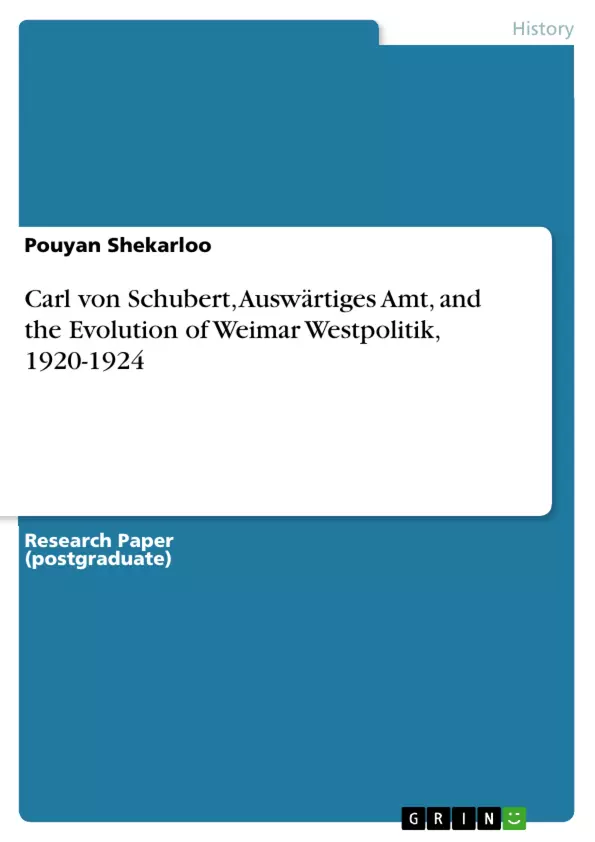Schubert did not only possess foresight and the “political sagacity of an old Roman” but he was probably the most ardent proponent of a new German foreign policy in the Weimar Republic, which pursued a modern understanding of diplomacy based on multilateralism and balancing of interest among the concert of European powers. Schubert was the incarnation of German “republican foreign policy” in the 1920s, which had abandoned power politics and stressed the importance of economics and trade, negotiations and cooperation instead. He was the distinguished person in the Auswärtiges Amt, which from the beginning called and pursued a coherent and steady policy of understanding and accommodation with the Western powers (United States, Great Britain, and France). Schubert knew that Germany would only be able to regain its former great power status if it succeeded to gain the trust and acceptance of the other powers through its cooperation and reliability. In this regard, he put all his strength and efforts in the service of an operational and professional Foreign Office to direct its policy towards this end.
However, German “republican foreign policy” and the emphasis of cooperation with the Western countries is highly connected with the person of Gustav Stresemann, Chancellor and Foreign Minister of the Weimar Republic from 1923-1929. Throughout the historiography on Weimar foreign policy, he receives all credit for a policy of modus vivendi with the Western powers and the special relationship that Germany established with the United States in particular after 1924. It is also well known that the Secretary of State, Carl von Schubert, was his right hand and that both complemented each other in the endeavour to bring Germany out of its international isolation and make it a respectable and reliable member of the concert of Europe. If Stresemann was the public face of this new policy, then Schubert was probably the backroom engineer of this strategy. As a duumvirate among the German foreign policy elite, they were responsible for the policies that led to the Dawes-Plan in 1924, Treaty of Locarno in 1925, and Germany’s admission to the League of Nations in 1926, and finally Germany’s accession to the Kellogg-Briand Pact in 1928.
Inhaltsverzeichnis (Table of Contents)
- Introduction
- Historiography on Weimar Foreign Policy
- Carl von Schubert and the Evolution of Weimar Westpolitik 1920-1924
- Schubert's Rise in the Auswärtiges Amt
- The German Foreign Policy Agenda 1920-1924: From Isolation to Cooperation
- The Legacy of Carl von Schubert: A "Republican" Diplomacy of Understanding and Accommodation with the West
- Conclusion
Zielsetzung und Themenschwerpunkte (Objectives and Key Themes)
This article examines the evolution of Weimar Westpolitik between 1920 and 1924, specifically focusing on the role of Carl von Schubert, Secretary of State in the German Foreign Office (Auswärtiges Amt). It aims to shed light on the foreign policy strategies pursued by the Auswärtiges Amt during this period, considering whether a coherent strategy existed prior to the rise of Gustav Stresemann in 1924.
- The role of the Auswärtiges Amt in shaping Weimar foreign policy
- Carl von Schubert's contribution to German Westpolitik
- The development of German-American relations in the early 1920s
- The emergence of a "republican foreign policy" in the Weimar Republic
- The shift from isolation to cooperation with Western powers
Zusammenfassung der Kapitel (Chapter Summaries)
- Introduction: This section introduces Carl von Schubert as a key figure in European diplomacy during the interwar years, highlighting his commitment to a new, multilateral German foreign policy based on cooperation and economic interests. The introduction also points to the prevalent misconception of German unreliability, arguing that Schubert worked towards changing this perception.
- Historiography on Weimar Foreign Policy: This section reviews the historical scholarship on Weimar foreign policy, focusing on key works by Ludwig Zimmermann, Peter Krüger, and Klaus Hildebrand. It discusses how the scholarly understanding of Weimar foreign policy has evolved over time, highlighting the importance of considering both internal and external factors.
- Carl von Schubert and the Evolution of Weimar Westpolitik 1920-1924: This section explores the central argument of the article, examining the role of Carl von Schubert and the Auswärtiges Amt in shaping German Westpolitik between 1920 and 1924. It will investigate the development of a coherent strategy prior to Stresemann's accession to power, analyzing Schubert's efforts to shift from isolation to cooperation with the Western powers. The chapter will also discuss the importance of economic factors and the pursuit of a "republican foreign policy" based on peaceful mediation and a liberal foreign trade policy.
Schlüsselwörter (Keywords)
This article examines Weimar Westpolitik, the German Foreign Office (Auswärtiges Amt), Carl von Schubert, Gustav Stresemann, "republican foreign policy," multilateralism, cooperation, economic interests, Versailles Treaty, revisionism, German-American relations, and the development of a coherent foreign policy strategy during the early 1920s.
Frequently Asked Questions
Who was Carl von Schubert in the Weimar Republic?
Carl von Schubert was the Secretary of State in the German Foreign Office (Auswärtiges Amt) and a key architect of Germany's "republican foreign policy" in the 1920s.
What was the focus of Weimar "Westpolitik" between 1920 and 1924?
The focus was on moving Germany from international isolation toward cooperation and accommodation with Western powers like the USA, Great Britain, and France.
How did Schubert's diplomacy differ from traditional power politics?
Schubert abandoned traditional power politics in favor of a modern understanding based on multilateralism, trade, negotiations, and building international trust.
What was the relationship between Carl von Schubert and Gustav Stresemann?
They formed a powerful "duumvirate"; while Stresemann was the public face, Schubert was the "backroom engineer" of the strategies leading to the Locarno Treaty and the League of Nations admission.
Why did Schubert emphasize reliability in German foreign policy?
He believed Germany could only regain its status as a great power if it succeeded in gaining the trust and acceptance of other nations through reliability and cooperation.
- Arbeit zitieren
- M.A. Pouyan Shekarloo (Autor:in), 2011, Carl von Schubert, Auswärtiges Amt, and the Evolution of Weimar Westpolitik, 1920-1924, München, GRIN Verlag, https://www.grin.com/document/177309



